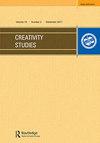COVID-19大流行中的创作过程和情绪
Q1 Social Sciences
引用次数: 1
摘要
目的是从参与者的角度分析新冠肺炎大流行在隔离和保持社交距离方面形成的创造性过程。主要兴趣是研究日常、家庭和工作生活中的转变,重点是创造新的实践和项目。同样,研究参与者感受到的情绪、障碍和困难也是相关的。这项研究是定性的,参与者(N=25)是通过非概率便利抽样选出的。所有参与者都居住在阿根廷的中小型城镇。数据收集于2020年9月进行。半结构化访谈和在线定性研究是数据收集工具。Atlas.ti 8程序用于文本和视听数据的定性分析。研究结果表明,由于隔离和疏远,参与者的生活发生了重大变化。这些变化要求灵活性和适应性,以及产生替代方案和解决问题的创造性过程。在家的背景下,观察到了时间、空间和关系的转变。工作和休闲活动也进行了重新配置。悲伤是最主要的情绪。然而,一些参与者对新项目充满热情和喜悦。本研究的目的是建立有助于健康促进项目设计的知识。本文章由计算机程序翻译,如有差异,请以英文原文为准。
CREATIVE PROCESSES AND EMOTIONS IN COVID-19 PANDEMIC
The objective was to analyse, from the perspective of the participants, creative processes developed in isolation and social distancing by COVID-19 pandemic. The main interest was to study transformations in daily, family and work life, focusing on the creation of new practices and projects. Likewise, it was relevant to study emotions, obstacles and difficulties perceived by the participants. The study was qualitative, the participants (N = 25) were selected by non-probabilistic convenience sampling. All the participants lived in intermediate or small towns in Argentina. Data collection was carried out in September, 2020. Semi-structured interviews and online qualitative research were the data collection instruments. The Atlas.ti 8 program was used for the qualitative analysis of textual and audio-visual data. The results indicated significant modifications in the lives of the participants from isolation and distancing. These changes demand flexibility and adaptability as well as creative processes for generating alternatives and solving problems. In the context of the home, transformations of times, spaces and relationships were observed. Work and leisure activities also were reconfigured. Sadness appeared as the predominant emotion. However, some participants experienced enthusiasm and joy for the new projects. The purpose of this study was to build knowledge that contributes to the design of health promotion project.
求助全文
通过发布文献求助,成功后即可免费获取论文全文。
去求助
来源期刊

Creativity Studies
Social Sciences-Cultural Studies
CiteScore
3.20
自引率
0.00%
发文量
38
审稿时长
15 weeks
期刊介绍:
Creativity Studies accepts original research articles with a focus on communication within the creative society. The journal welcomes contributions from scholars from diverse disciplines such as philosophy, sociology, history, political, communication and information sciences. Creativity Studies also publishes survey papers and descriptions of academic events in this area. The journal issues will be organized around different issues on creativity.
 求助内容:
求助内容: 应助结果提醒方式:
应助结果提醒方式:


